Pro-Palestine student demos intensify, expand to universities across US, Europe
By Press TV Staff Writer
Massive student protests at Columbia University, which began last week and were met with arrests and suspensions, have triggered a wave of similar protests across the US and Europe.
The initial crackdown, which involved arrests of more than 100 demonstrators at Columbia University, ignited a broader movement rallying against the Israeli genocidal war on Gaza and later spread to Harvard University, George Washington University, Massachusetts Institute of Technology, Yale University, Stanford University, and the University of Southern California, etc.
Students and faculty members at these and other prestigious universities have in recent days organized rallies, urging their respective universities to sever ties with entities supporting Israel’s genocidal onslaught on Gaza, which is now in its seventh month.
This demand extends to dissociating from the Israeli regime itself. In many cases, police and security forces have responded with brute force and hundreds of arrests.
Footage circulating online shows policemen using batons to disperse peaceful protesters at Columbia University and other universities, not even sparing female students and senior professors.
In one of the viral videos, a female professor was heard screaming “I am a professor” as trigger-happy men in uniform pinned her to the ground with utter disdain.
At Columbia University, students last week set up more than 60 tents on the campus’s south lawn, which were covered in signs that read “Liberated Zone” and “Israel bombs, Columbia pays”, urging the university administration to divest from corporations that profit from Israel’s war on Gaza.
In response, university president, Nemat “Minouche” Shafik authorized the New York police department to break up the encampments, claiming that they “pose a clear and present danger to the substantial functioning of the university.”
“Where is the freedom of expression?”
— Highlights (@highlightsnews1) April 27, 2024
Press TV interviews a foreign pro-Palestine student in Tehran as university students hold rallies to show their solidarity with those facing crackdowns for supporting Palestine. pic.twitter.com/GsAjESA1cv
Symbolic gesture of solidarity
At George Washington University, over 50 students erected a tent encampment, a symbolic gesture of solidarity, on Thursday. They waved Palestinian flags, beat drums and chanted slogans
The demonstration attracted support from other universities like Georgetown University, amplifying the impact. Under intense police presence on the edges of the encampment, Georgetown University students and professors held rallies and marched to the campus to join the protesters there.
Central to their demands is an end to US military aid to Israel and a call for divestment from Israeli-affiliated firms, apart from the lifting of sanctions against pro-Palestinian student groups.
Harvard University in Cambridge, Massachusetts, implemented stringent security measures ahead of classes to preempt protests earlier this week, restricting access to Harvard Yard and cautioning against the setups.
Notwithstanding these attempts to silence pro-Palestine protesters, demonstrators erected a camp with 14 tents in an "emergency rally" against the suspension of the Harvard Undergraduate Palestine Solidarity Committee, also known as Harvard for Palestine.
The suspension stemmed from the group's involvement in a previous protest within Harvard Yard, as revealed in correspondence obtained by the university’s student newspaper, The Harvard Crimson. The university directive mandated the cessation of all organizational activities by the advocacy group for the spring term.
Meanwhile, at the University of Southern California (USC), the rapidly growing protests prompted the cancellation of the main stage graduation ceremony. The Los Angeles Police Department reported over 90 arrests for alleged trespassing during Wednesday night's protest on campus.
Campus authorities, in collaboration with law enforcement agencies, took harsh actions, including the removal of tents and subsequent confrontations with protesters.
Despite the use of unwarranted force, community solidarity was evident, with chants demanding the release of the detainees ultimately leading to their release.
These events have drawn parallels to past campus activism, such as the Vietnam War protests of the 1960s, highlighting the enduring legacy of student movements for social and political change.
Additionally, situating these protests within the broader context of global solidarity movements underscores their significance in contemporary discourse on human rights and justice.
“Where is the freedom of expression?”
— Highlights (@highlightsnews1) April 27, 2024
Press TV interviews a foreign pro-Palestine student in Tehran as university students hold rallies to show their solidarity with those facing crackdowns for supporting Palestine. pic.twitter.com/GsAjESA1cv
Campus activism gets a new definition
At Princeton University, around 100 students, both undergraduate and graduate, convened for a sit-in at a campus courtyard, defying the university's warnings by erecting tents as part of their protest.
Like protesters in other universities, their demands included urging the university to divest from entities profiting from Israel's military operations and to sever ties with Israeli academic and business ventures.
Princeton President Christopher Eisgruber underscored the institution's commitment to free expression but emphasized the prohibition against encampments in a published article.
Similarly, Vice President Rochelle Calhoun warned of consequences, including arrest and campus expulsion, for those engaging in pro-Palestine advocacy on the campus.
Any student participating in an "encampment, occupation, or other unlawful disruptive conduct who refuses to stop after a warning will be arrested and immediately barred from campus," Calhoun wrote in an email to undergraduates.
Meanwhile, at Yale University, protests persisted albeit with diminished participation since Monday's mass arrests. Earlier in the week, 48 individuals, including 44 students, were arrested and charged with trespassing after staging a multi-day encampment at Beinecke Plaza.
The initial demonstration on Sunday drew hundreds, urging the disclosure and divestment of Yale's investments in arms manufacturers aiding the genocide in Gaza.
Reports of journalists from the Yale Daily News facing arrest threats, coupled with President Peter Salovey's threat of disciplinary measures, further highlight the intensity of the situation.
“We are here for Gaza”
— Palestine Highlights (@PalHighlight) April 27, 2024
Some US students speak to Press TV and explain the reasons behind the growing anger on university campuses in the US. pic.twitter.com/gFE9m9ujcO
Nationwide surge in Gaza solidarity
The events unfolded in the besieged Gaza Strip, where the death toll has already topped 34,400, the majority of them children and women, have sparked massive protests globally in recent months.
In the US, demonstrations have been held in many cities since October last year, which have now extended to college campuses, adding a new dimension to the pro-Palestine movement in the country.
California State Polytechnic University, Humboldt, also witnessed pro-Palestine protests this week as demonstrators used furniture, tents, and zip ties to obstruct building entrances, prompting clashes with law enforcement agencies.
Protesters chanted: “We are not afraid of you!” before officers in riot gear pushed into them at the building’s entrance, using brute and indiscriminate force, which led to many injuries.
The campus was closed this weekend due to the occupation of multiple buildings, with contingency plans being considered. University officials said in a statement three students had been arrested.
New York University faced a similar scenario as a student-led encampment expanded with hundreds of protesters, culminating in the arrest of 133 protesters.
In Indiana University Bloomington, tensions flared as police arrested 33 student protesters.
Solidarity demonstrations emerged across prestigious institutions such as Emory University, Northwestern University, Cornell University, and the City College of New York, signaling a growing movement. At the University of Texas at Austin, riot gear-clad officers arrested numerous students during a mass protest in support of Palestinians.
Boston witnessed fervent activism across multiple campuses, notably at Emerson College, where clashes ensued between police and protesters, resulting in over 100 arrests.
"The big vans, they came in, they parked right in front of this alleyway and the cops came up and they started arresting students, forcing their way into the encampment and everything, pushing students to the ground," Emerson sophomore Kyle Graff was quoted as saying about the arrests.
"I saw one student get shoved into the pavement and their hands forced to be put behind them."
Massive marches rally to protect the newly established 'Gaza Solidarity Encampment' at New York University amid worries of police presence and potential attempts to dismantle it pic.twitter.com/EwkVcqcNoy
— Palestine Highlights (@PalHighlight) April 27, 2024
Cross-continental uprising
From London to Geneva, pro-Palestinian groups across Europe intensified their advocacy efforts, staging rallies, marches, and vigils to denounce Israel's genocidal war on Gaza.
This surge in activism has extended to academic institutions, drawing hundreds of students to demand the severance of ties with the Israeli regime.
In the UK, student protests have garnered significant attention, characterized by larger-scale demonstrations compared to the US.
Matt Beech, from the University of Hull, believes that the regular, massive protests in cities like London provide students with a sense of efficacy and a broader platform for their voices.
Despite threats of visa revocation and expulsion for foreign students, student occupations on university campuses, such as at Goldsmiths, the University of London, have occurred.
Germany, which has been deeply complicit in the Israeli war on Gaza, has also banned pro-Palestinian protests, riding the false bogey of “antisemitism.”
German police cleared a group of pro-Palestinian protesters who set up a camp outside Germany's Parliament in Berlin on Friday, inspired by the US campus protests.
Similarly, France's legal proceedings have resulted in protests being permitted on a case-by-case basis, with recent police interventions in Paris sparking criticism from university officials and student unions.
French police in Paris broke up a pro-Palestine rally by dozens of university students on Thursday, as protests swept US college campuses.
The police's brutal action against dozens of students gathered on the famous Sciences Po University's central Paris campus also sparked controversy.
Following the police's brutal action toward students, the Student Union of Sciences Po Paris stated that university officials' decision to send in the police was "both shocking and deeply worrying" and indicated "an unprecedented authoritarian turn."
Ireland witnessed a notable incident where Martha NíRiada, president of the University College Dublin Students' Union, was forcibly ejected from an event attended by Nancy Pelosi for voicing student dissent against the honorary degree awarded to Pelosi.
"I was thrown out with excessive force from Nancy Pelosi's honorary doctorate of law @ucddublin earlier today for representing the views of students as @UCDSU President. Why does UCD continue to platform Zionist warmongers whilst silencing students?"Riada wrote on X
"I called her a Zionist and a war criminal. There was more that I wanted to say as representing students, we denounce this honorary degree; it is not reflective of students' wishes, and she should not be celebrated in this way," the Student Union President was quoted as saying.
Pro-Palestine protests spread to Europe as students occupy campus in Paris pic.twitter.com/mNJN6Vav6j
— Palestine Highlights (@PalHighlight) April 27, 2024
US-Israeli authorities unnerved by protests
Israeli regime premier Benjamin Netanyahu labeled protests against Israel's genocide in Gaza at US universities as "horrific" and condemned the demonstrators, accusing them of “antisemitism.”
Netanyahu's remarks, his first on the subject, sought to portray the protests as a threat to Jewish students and faculty, aiming to equate criticism of Israel with hatred of Jews.
“Antisemitic mobs have taken over leading universities. They call for the annihilation of Israel. They attack Jewish students. They attack Jewish faculty,” he said.
Echoing Netanyahu's sentiments, US House Speaker Mike Johnson, a conservative Republican, condemned the protests during a visit to Columbia University, describing them as violent and antisemitic.
Johnson urged President Biden to consider deploying the National Guard to suppress the demonstrations at Columbia.
Students, however, remain resolute in their calls for universities to support a ceasefire in Gaza and divest from companies with Israeli ties.
They view their activism as important to ensure accountability and justice, even in the face of potential disciplinary actions or arrests.
Major Rafah invasion won’t defeat Hamas: White House
VIDEO | Iranians celebrate National Girls’ Day in Lady Fatima Masoumah’s Holy Shrine
UN to vote on Palestinian statehood as student protests continue
Houthi: Yemen to target Israel-linked ships regardless of destination
UK holds firm on arms exports to Israel despite Rafah invasion
Putin says Russia’s nuclear forces ‘always on alert’
New York Times’ Pulitzer Prize for Gaza war coverage a travesty of journalism
Campus protests: Iran says US, Europe value Israel above human rights


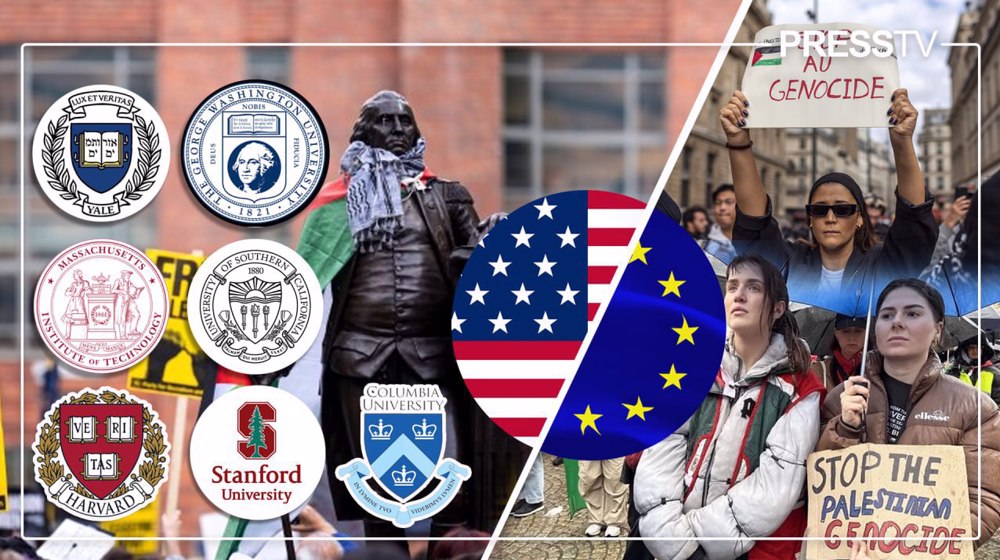
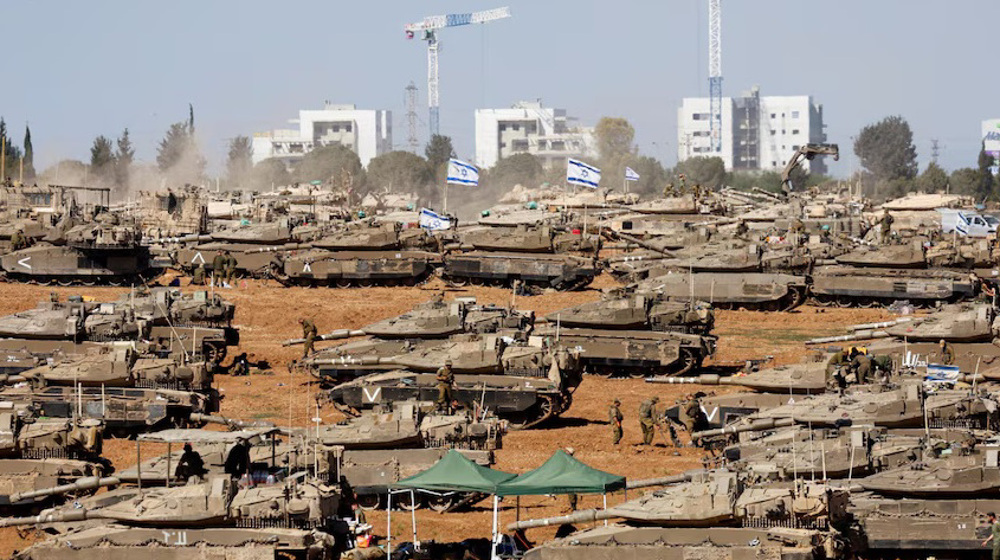

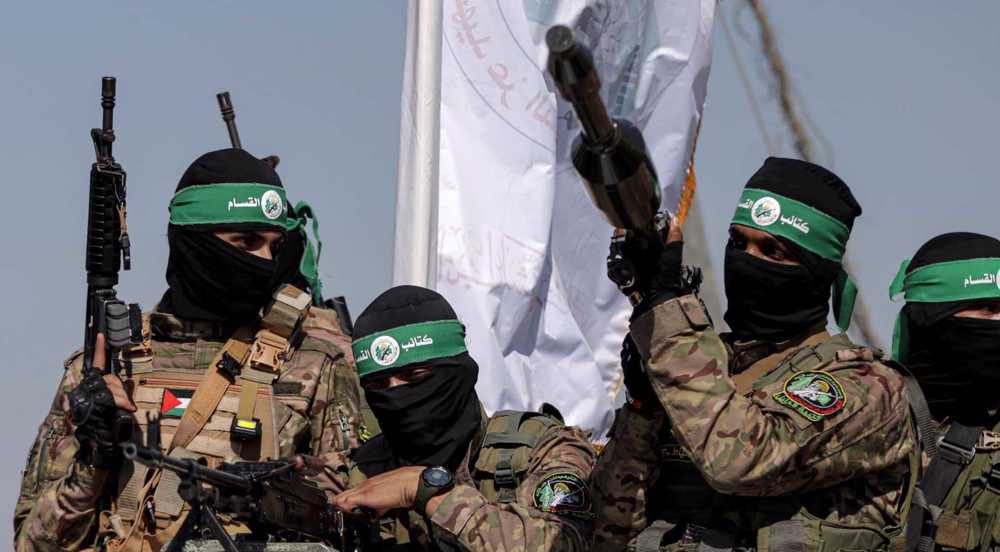



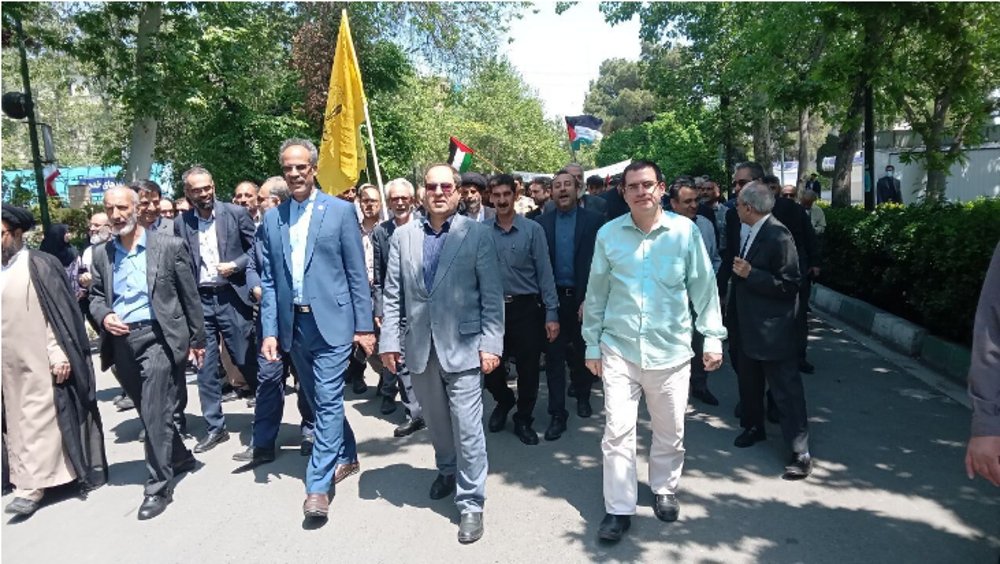
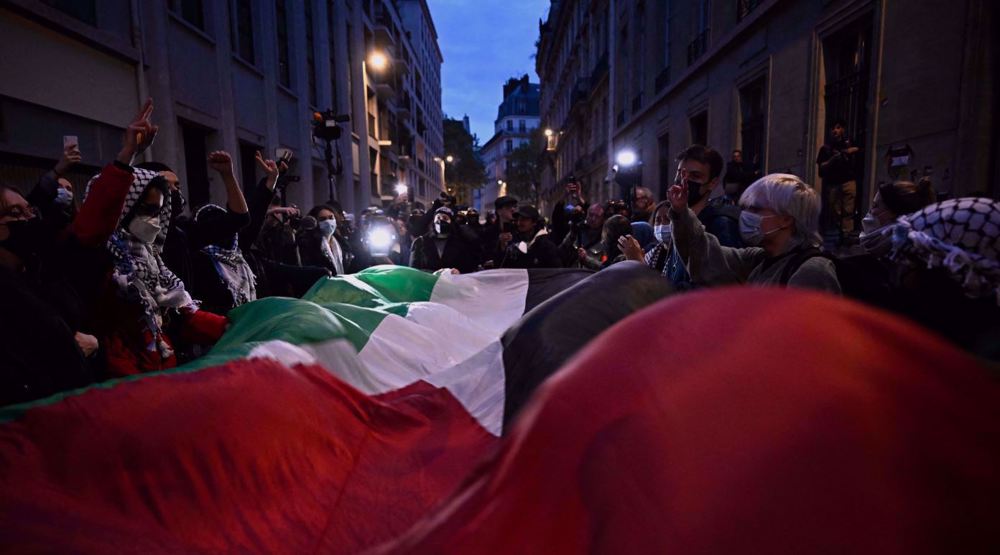
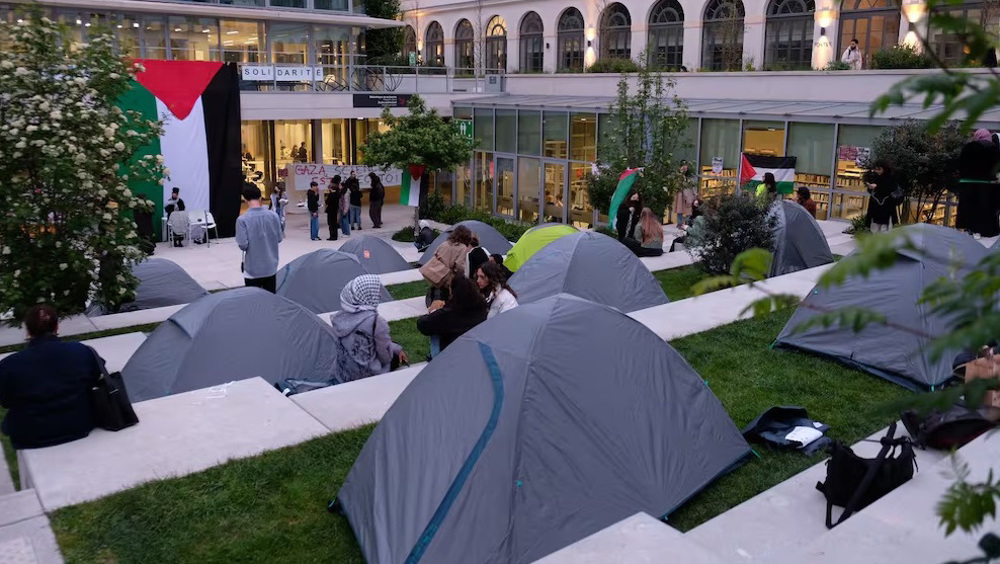
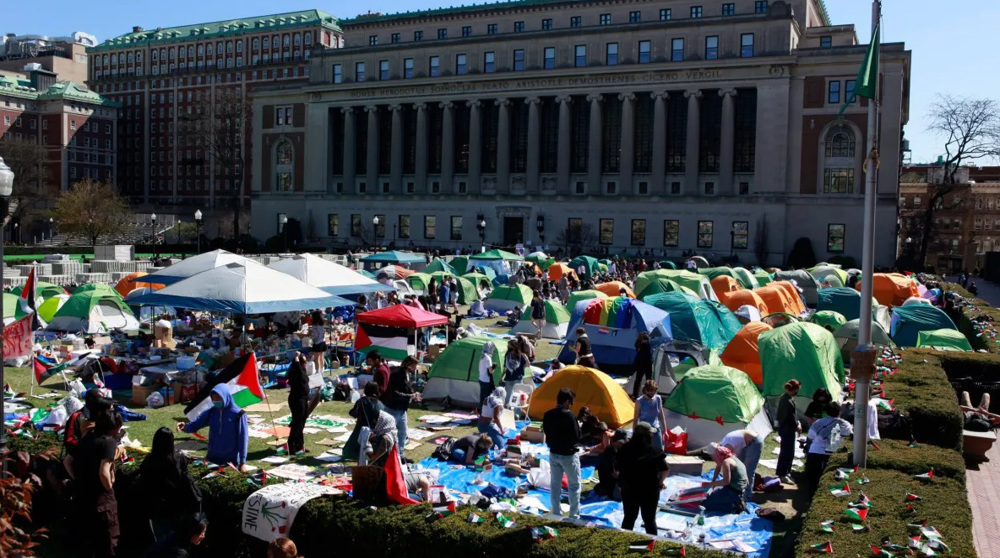
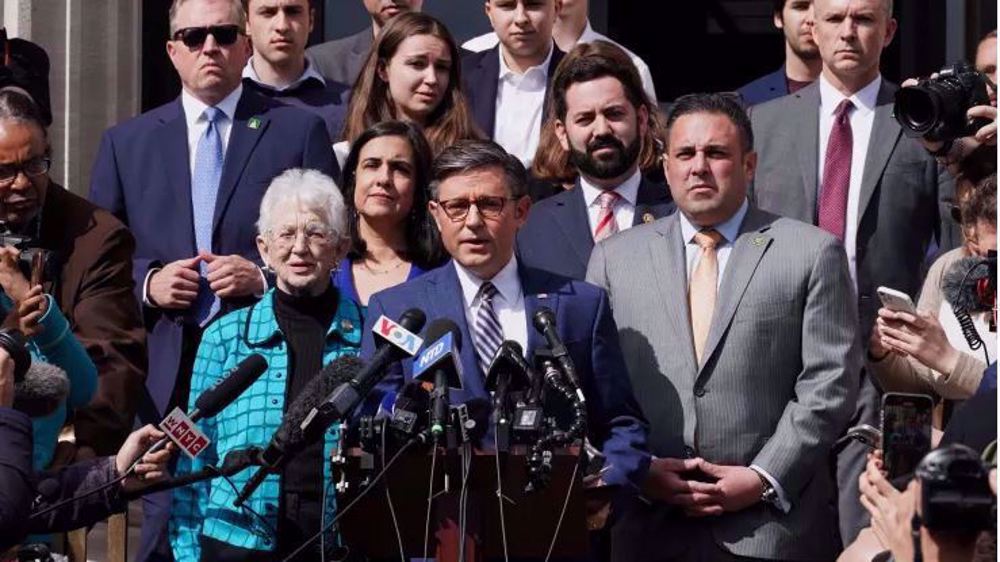

 This makes it easy to access the Press TV website
This makes it easy to access the Press TV website